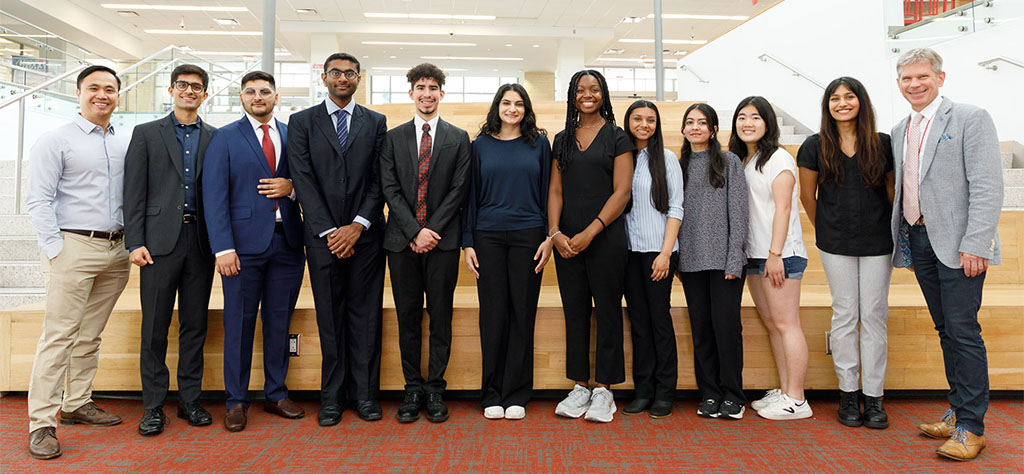Participants, Paired with Faculty Mentors, Created and Presented Research Projects, Attended Globally Recognized Conference
Ten undergraduate students from seven universities across the country had the opportunity this summer to conduct research at the University of Houston as part of a new program dedicated to training the next generation of cardiovascular health professionals. The UH Cardiovascular Undergraduate Research Experience, or UH-CURE, provided students with 10 weeks of hands-on research training and career development.

“This program made me realize how much more of an impact I can have on my field as a physician if I integrate basic science research into my career,” said Lakshmi Surada, a biology major from Rensselaer Polytechnic Institute. “After this summer, I am more sure that I want to be a physician-scientist and work on bridging the gap between bench and bedside.”
Students were paired with faculty mentors from various UH colleges, including five faculty from the College of Natural Sciences and Mathematics, to expose them to different disciplines within the cardiovascular health field. Other participating faculty were from the UH Colleges of Pharmacy, Medicine, Engineering, and Liberal Arts and Social Sciences.
“This program provides a breadth of cardiovascular research experiences across disciplinary lines, from community engagement and population-based research to basic, translational and applied research, while emphasizing the research’s significance and innovation,” said Bradley McConnell, professor of pharmacology at the UH College of Pharmacy and UH-CURE program director. “We are ultimately preparing students for successful careers in cardiovascular research.”

Each student had their own research project and organized poster and oral presentations throughout the program. For example, Surada focused on studying pathways for the regeneration of nucleotides, organic compounds in DNA and RNA, within adult heart cells.
“In the research I have done this summer with UH-CURE, I was able to learn and perform techniques such as cell seeding, transfection, RNA extraction, reverse transcription, and quantitative polymerase chain reaction (a lab technique used in molecular biology to measure DNA),” Surada said.
Through designing and conducting her experiment, she learned a lot about time management, especially in research.
“Creating PowerPoints and posters about my research for the mid- and end-of-program presentations has been an invaluable skill I gained,” she said.
Using Expansion Microscopy to Study the Blood-Brain Barrier
Other UH-CURE participants, like Eduardo Lopez Quintero, researched the blood-brain barrier that prevents dangerous substances from entering the brain. The biochemistry and molecular biology major from Houston Christian University used expansion microscopy with India ink staining to increase the resolution of the tightly compacted cells that comprise the blood-brain barrier. India ink stains the background of a slide and keeps the organism clear.
“One of the only ways to effectively visualize tight junctions in the blood-brain barrier is through an electron microscope, which is expansive,” said Lopez Quintero. “Expansion microscopy is a novel method that expands the specimen to four to eight times its original size, making it easier, accessible and cost-effective to produce high-resolution images.”
Students Connected with Leading Experts at Globally Recognized Conference
One of the most memorable experiences for UH-CURE students was attending the American Heart Association Basic Cardiovascular Sciences conference in Chicago. They learned about the latest cardiovascular research, networked with leading experts and peers, and explored the city.
“Many of them are traveling for the first time on their own, so it’s a very transformative process, especially when it’s at a globally recognized conference,” said Tho Tran, research assistant professor of chemistry at the UH College of Natural Sciences and Mathematics and assistant director of UH-CURE.
Eira Mann, a biology major at UH, said the comradery established between students was her favorite aspect of UH-CURE.
“I loved the AHA Basic Cardiovascular Sciences conference and learned a lot, but being able to travel with my new friends was so much fun,” she said.
In addition to leading UH-CURE, professors Tran and McConnell set up weekly workshops led by faculty that covered topics such as research training, general science and career development, along with mentor mini-talks with faculty mentors. The career development workshop, “How I Got Here,” featured both a graduate student panel and a faculty panel that allowed students to gain insights into the unpredictable nature of career paths.
CPR training was also offered, along with workshops on the business of healthcare and on using artificial intelligence in health professions, to provide participants with even broader knowledge for their careers.
Participants Supported through Stipend
The program is supported by a $792,900 grant from the National Heart, Lung, and Blood Institute of the National Institutes of Health. This funds a $6,000 stipend for 10 students each year for five years, on-campus housing, and travel to a conference.
Tran and McConnell are proud of students’ growth this summer and the program’s success.
“I always enjoy seeing how much improvement they go through, especially when you compare their first presentation mid-program with their final presentation on the last day,” said Tran. “At first, the students were anxious and nervous. However, towards the end, they are much more confident in themselves and can communicate their science very well.”
Applications for the summer 2025 UH-CURE program will open in December. For more information, visit the UH-CURE website.
- Rebeca Hawley for College of Natural Sciences and Mathematics